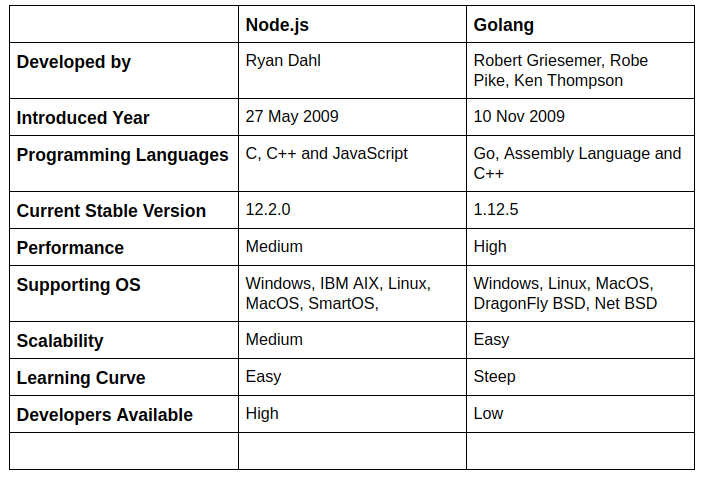Nodejs vs Golang

For a Developer, It's very important to decide which language he should use to develop an application with a specific requirement. There are different languages which look similar at a glance but when going dipper into it clears the advantages and disadvantages.
Now before moving into detailed article, Let's have a look on the basic differences between both:

Go is Google's simple programming language and Node.js is runtime JavaScript code execution. But both works for backend development.
Go writes the code that is executable at the server-side while Node.js creates an environment for JavaScript to execute it's code on the server side.
Now let's compare the differences pointwise.
Performance
Node.js: Node.js has been derived from JavaScript and appears to be slower in writing executable code, but overall with regards to performance it is good to go with.
Golang: Golang has similar performance as with C or C++, which is very good.
Concurrency
Concurrency in very simple terms means that two or more processes (or threads) run together, but not at the same time. Only one process executes at once.
Node.js: Node.js handles some of the world’s heaviest, scalable workloads on it’s seemingly ‘single-threaded’ event-loop. Node.js is single-threaded, which means that the execution instructions are performed in sequence. And this may be its Achilles’ heel when it comes to large applications requiring massive scaling with a lot of parallel processes executed at the same time. JavaScript allows some concurrency with event callbacks; however, they are not too effective.
Golang: Golang uses coroutines called “goroutines”. Goroutines allow multiple threads to be performed simultaneously with parallel tasks executed easily and reliably.
Learning Curve
Node.js: Since Node.js is available in the industry from a long time. There are so many options available for learning it over the internet.
Golang: Go is new in comparison to Node.js with less resources and options to enhance learning for developers.
Error Handling
Node.js: Nodejs uses the traditional throw catch error technique, wherein errors are fixed immediately as soon as they occur.
Golang: Go poses a problem for developers with its explicit runtime and compilation time error mechanism.
Scalability
Node.js: Node.js has a weaker parallel process and is not suitable for larger project development work.
Golang: Golang uses Go-routines which allow multiple threads to perform parallel tasks at a single go.
Development Tools
Node.js: Since Node.js is a runtime environment that runs on JavaScript environment, there is a multitude of libraries, frameworks, and tools available for it
Golang: Number of libraries, tools, and packages available are very few. So it's a little bit challenging with Golang developers.
Blockchain Integration
Node.js: Node.js is not suitable for blockchain implementation.
Golang: Go language is more agile and simplified for incorporating Blockchain technology.
Community Support
Node.js: Node.js has very huge community support.
Golang: Golang is not used widely like Node.js yet, So community support is very less.
Brands Relying
Node.js: Godaddy, Netflix, Linkedin, Paypal, Groupon, Walmart.
Golang: Google, BBC, Docker, BaseCamp, Medium, Dropbox.
Conclusion
Node.js and Go, both have their pros and cons and it is a very tough task to choose one. But you can definitely select it according to your specific project requirements.
Click here to see Node.js Sample Application to get started for enterprise-level application.
Let me know your thoughts over the email demo.jsonworld@gmail.com. I would love to hear them and If you like this article, share with your friends.